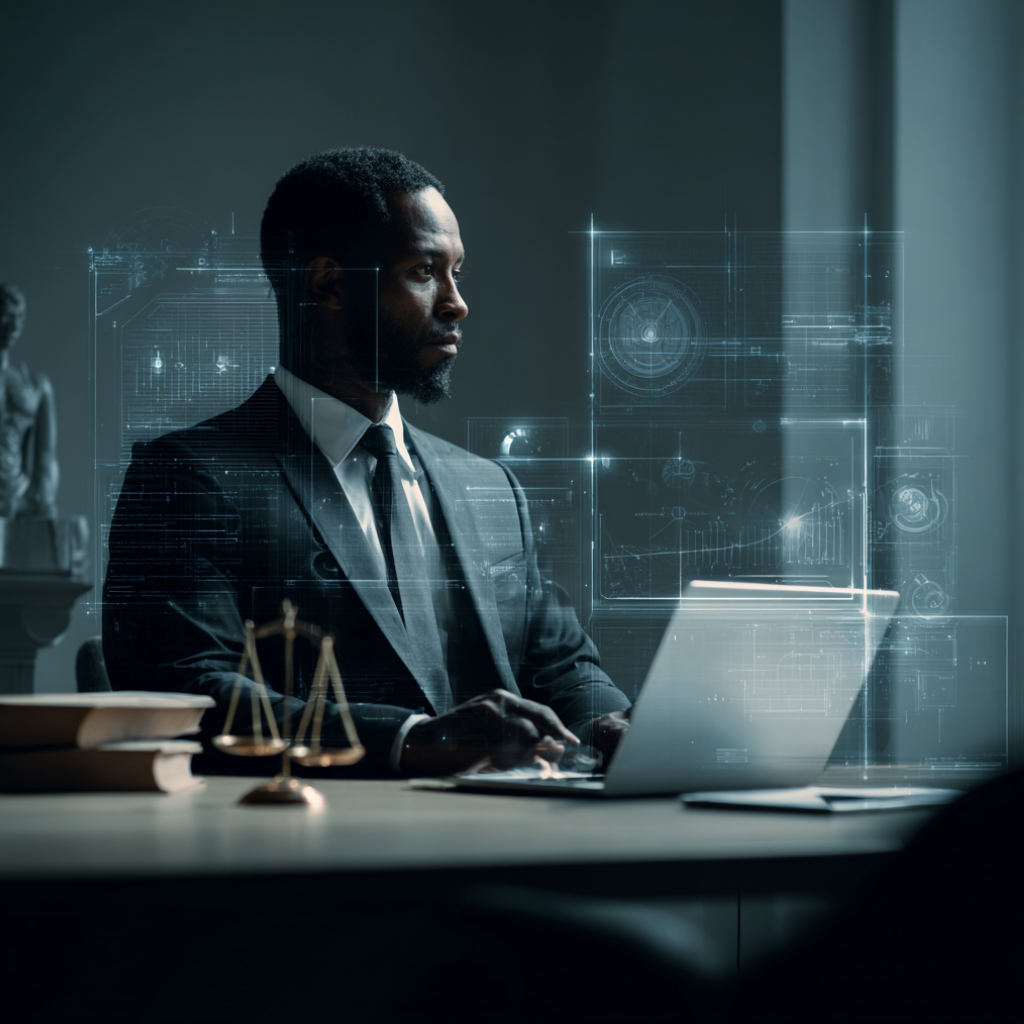A historic business facing algorithmic change
The legal profession, a pillar of the justice system and guarantor of the rule of law, is undergoing a profound transformation in the age of artificial intelligence (AI). Far from being confined to technology laboratories, AI is now taking over law firms, courts and legal platforms. Automated drafting, predictive analysis, assisted jurisprudence research: so many functions now augmented by algorithms.
According to a Wolters Kluwer study from 20241,
- 76% of legal professionals are using or testing AI tools in their practice,
- 82% consider that AI will improve the quality of legal services in the next five years,
- and 69% believe it will profoundly transform the way legal advice is delivered.
This technological revolution does not call into question the function of the lawyer, but redefines his or her modalities, tools and key skills.
Practical uses of AI in law firms
Artificial intelligence is becoming part of everyday legal life in the form of specific, targeted and increasingly widespread applications:
- Intelligent document search: tools such as ROSS Intelligence or Harvey AI can explore thousands of legislative texts, court rulings or doctrines in a matter of seconds, with detailed semantic contextualization.
- Contract analysis and due diligence: platforms such as Luminance, Kira Systems and Loio support lawyers in rapidly analyzing contractual clauses, detecting anomalies or reviewing complex documents.
- Prediction of judicial decisions: predictive models tested in patent law and labor law, for example, can be used to estimate the chances of success of an appeal, or to model the past behavior of certain courts.
- Legal content generation: wizards such as ChatGPT or Legito are used to propose draft contracts, conclusions or personalized letters based on trained templates.
Other fields are emerging:
- Tax law and compliance: with AI capable of identifying areas of risk in complex tax returns, or tracking regulatory developments in real time.
- Access to the law for individuals: legal chatbots (like DoNotPay or Legalstart) offer low-cost initial legal assistance for litigants.
Reinventing legal skills
As the tools become more sophisticated, the skills expected of lawyers evolve. It’s no longer just a matter of mastering texts, but of understanding, framing and using the systems that interpret them. In the age of AI, several skills become strategic:
- Critical reading of AI output: assess the reliability of an answer generated by a model (verification of sources, detection of reasoning errors).
- Designing legal prompts: formulating the right queries to guide the machine in legal analysis or drafting.
- Human-machine interoperability: collaborate with intelligent tools while ensuring the security, confidentiality and legal compliance of processed data.
- Automated regulatory watch: harness AI to detect regulatory changes in complex areas (RGPD, business law, environmental law).
- Enhanced customer support: offering enriched services through risk visualization, scenario analysis and personalized legal strategy.
According to Gartner’s LegalTech Report (2024)2more than 60% of international law firms are now recruiting hybrid profiles (lawyer + data analyst) to support the digital transformation of the profession.
Towards an ethically enhanced profession
Contrary to popular belief, artificial intelligence does not dehumanize the law: it reexamines the responsibility of professionals and their ability to integrate technologies within a demanding ethical and legal framework. Several projects are currently underway:
- Traceability of decisions: it is imperative to be able to audit the recommendations made by AI systems, especially in sensitive cases.
- Algorithmic neutrality: lawyers must ensure that tools do not reproduce systemic biases derived from training data.
- Respect for professional secrecy: when using AI assistants, the confidentiality of customer data remains a fundamental requirement.
- Shared responsibility: who is liable if AI-generated legal advice is wrong or damaging? The tool provider, the lawyer or the customer?
New standards are being discussed at European level, as part of the AI Act, to regulate these uses, with specific requirements for the legal professions.3.
What will the legal profession look like in the future?
Tomorrow’s lawyer will neither be replaced by AI, nor simply a passive user of legal technologies. They will become :
- Automation strategist: able to delegate repetitive tasks to algorithms and concentrate on high value-added missions.
- Augmented advisor: using AI-generated predictions, analyses and summaries to fine-tune advice.
- Legal educator: guiding customers through the complexities of technology and providing a human interpretation of the tools.
- Permanent legal watchdog: harnessing the power of AI to anticipate regulatory and case law developments.
The role is thus becoming more cross-functional, more focused on strategy and governance, and more firmly rooted in interdisciplinarity (law, data science, ethics).
A business that’s changing, but not disappearing
Lawyers will not be replaced by artificial intelligence. However, they will have to integrate these tools, rethink their professional posture and broaden their skills to remain relevant in an increasingly digitized environment.
AI technologies make it possible to automate repetitive tasks, speed up legal research and improve the customer experience. But they do not do away with the capacity for argumentation, ethical discernment or the human relationship, which remain at the heart of legal practice. This is where the “augmented” lawyer can find new added value.
So the question is no longer: will AI replace lawyers? but rather: how can lawyers redefine their role in an automated legal world?
The answer is beginning to emerge: by becoming enlightened intermediaries between intelligent systems and litigants, lawyers can establish themselves as guarantors of fairness, regulation and legal certainty. Provided they are trained, proactive and committed, they have the opportunity to make artificial intelligence a lever for strengthening the rule of law, rather than a factor in diluting it.
References
1. Wolters Kluwer. (2024). Future Ready Lawyer Survey Report.
https://www.wolterskluwer.com/en/expert-insights/future-ready-lawyer-2024
2. Gartner. (2024). LegalTech Trends for 2024.
https://www.gartner.com/en/documents/legaltech-report-2024
3. European Commission. (2024). AI Act Proposal.
https://digital-strategy.ec.europa.eu/en/policies/european-approach-artificial-intelligence

